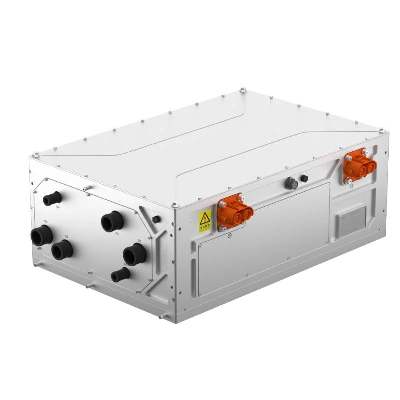Hydrogen Fuel Cell ReactorReliable Portable Hydrogen Fuel Cell for
Private Houses Product DescriptionOur reactor uses hydrogen as a
fuel source to generate electricity in a clean and efficient
manner. Unlike traditional power generators, our fuel cell reactor
produces no harmful emissions or pollutants, making it an ideal
choice for those who prioritize sustainability and environmental
responsibility.At the heart of our product is a cutting-edge proton
exchange membrane (PEM) fuel cell, which converts hydrogen into
electricity through an electrochemical reaction. Our reactor is
designed to be easy to use and operate, requiring only a source of
hydrogen and an electrical load to begin generating power. With no
moving parts and minimal maintenance requirements, our fuel cell
reactor provides a reliable and hassle-free source of electricity
for a wide range of applications.Whether you're looking to power
your home, business, or off-grid cabin, our hydrogen fuel cell
reactor delivers the performance and reliability you need. With a
compact and modular design, our reactor can be easily scaled up or
down to meet your specific power requirements. And with a high
power density and quick start-up time, our reactor delivers
reliable power whenever and wherever you need it.Invest in the
future of energy with the Hydrogen Fuel Cell Reactor - the clean,
efficient, and sustainable solution to your power needs.Product
nameHydrogen fuel cell reactorNumber of reactor segments420Rated
power140kwPeak power150kwOperating ambient
temperature-30ºC~45ºCDesign life>10000H* Customizing products
according to customer requirements.Technical PrincipleWorking
Principle of Hydrogen Fuel Cell Reactor Hydrogen fuel
cell reactor generates electrical energy by converting the chemical
energy stored in hydrogen gas into electrical energy through an
electrochemical process. The fuel cell reactor consists of an
anode, a cathode, and an electrolyte membrane.The hydrogen gas is
fed into the anode side of the fuel cell reactor, where it reacts
with a platinum-based catalyst to produce protons and electrons.
The protons pass through the electrolyte membrane to reach the
cathode side, while the electrons are forced to flow through an
external circuit to reach the cathode. This flow of electrons
generates electrical current that can be used to power electrical
devices.At the cathode side, oxygen gas is fed into the fuel cell
reactor, and it reacts with the protons and electrons to form water
and heat. The water vapor and heat are the only by-products of the
reaction, making the fuel cell reactor a clean and efficient energy
source. The key to the fuel cell reactor's operation is the
electrolyte membrane, which allows only positively charged protons
to pass through while blocking the negatively charged electrons.
This membrane separates the anode and cathode, preventing them from
coming into contact and shorting out the fuel cell reactor.Overall,
a hydrogen fuel cell reactor is a reliable and efficient energy
source that operates through an electrochemical process, with a
modular and scalable design that makes it suitable for a wide range
of applications.ApplicationsTransportationPortable
ElectronicsBackup PowerFuel cell vehicles (FCVs) use hydrogen fuel
cells to power electric motors, offering a zero-emission
alternative to conventional internal combustion engines. They
can be used in cars, buses, trucks, and even trains and
ships.Hydrogen fuel cells can power small electronic devices like
smartphones, laptops, and tablets, providing longer battery life
and faster charging.Fuel cells can serve as backup power systems
for critical infrastructure, such as data centers, hospitals, and
emergency responsecenters. They ensure uninterrupted electricity
supply during power outages.Remote Power GenerationStationary Power
GenerationMaterial HandlingIn remote or off-grid locations, fuel
cells can provide reliable electricity for communities or remote
installations, such as weather stations and telecommunication
towers.Fuel cells can be used as stationary power plants to
generate electricity for homes, businesses, and industrial
facilities, operating as distributed energy systems.Hydrogen fuel
cells power forklifts and other industrial vehicles, offering
longer operating times and faster refueling comparedto traditional
battery-powered equipment. Detailed Photos Related
ProductsMembrane ElectrodeBipolar PlateCatalyst Collector
PlateHydrogen Fuel Cell Titanium MeshNickel Mesh For Hydrogen Fuel
Cells Certifications /* January 22, 2024 19:08:37
*/!function(){function s(e,r){var
a,o={};try{e&&e.split(",").forEach(function(e,t){e&&(a=e.match(/(.*?):(.*)$/))&&1
Related products about Reliable Fuel Cell Battery Portable Hydrogen Generator Fuel Cell for Hydrogen Car
-
 Waste Tyre Plastic Recycling Machinery Machine Tire Crusher Production Line Rubber Crumb Grinding Machine Equipment Tire Shredder
Waste Tyre Plastic Recycling Machinery Machine Tire Crusher Production Line Rubber Crumb Grinding Machine Equipment Tire Shredder
-
 Stretch Plastic Blowing Pet Bottle Making Blow Molding Machine Bottles Stretch Automatic Pet Bottle Blowing Machine
Stretch Plastic Blowing Pet Bottle Making Blow Molding Machine Bottles Stretch Automatic Pet Bottle Blowing Machine
-
 Waste Plastic Pet Bottle, Water Bottle Flake, PP/HDPE/LDPE PE Film Jumbo Woven Bags Plastic Crusher Machine, Plastic Crushing Washing Recycling Machine
Waste Plastic Pet Bottle, Water Bottle Flake, PP/HDPE/LDPE PE Film Jumbo Woven Bags Plastic Crusher Machine, Plastic Crushing Washing Recycling Machine
-
 Type 2 Wall-Mounted Electric Car Charging Station 7kw /11 Kwelectric Vehicle Charging Station Home Wallbox AC EV Charger Single Phase or 3three Phase
Type 2 Wall-Mounted Electric Car Charging Station 7kw /11 Kwelectric Vehicle Charging Station Home Wallbox AC EV Charger Single Phase or 3three Phase
-
 G-View G12W Wholesale Auto Car LED Headlight Bulb High Power H13 H11 9005 H7 H4 Car LED Headlights LED Car Lights
G-View G12W Wholesale Auto Car LED Headlight Bulb High Power H13 H11 9005 H7 H4 Car LED Headlights LED Car Lights
-
 New Design Porcelain Round Plates Dinner Set for Wedding and Banquet
New Design Porcelain Round Plates Dinner Set for Wedding and Banquet
-
 China 2023 New Design Super Soft 100% Polyester Microfiber Knitted Oversized Decoration Hoodie Blanket
China 2023 New Design Super Soft 100% Polyester Microfiber Knitted Oversized Decoration Hoodie Blanket
-
 Handmade Art Creative Materials Thickened White Paper Cup DIY Disposable Handmade Colored Paper Cup
Handmade Art Creative Materials Thickened White Paper Cup DIY Disposable Handmade Colored Paper Cup



